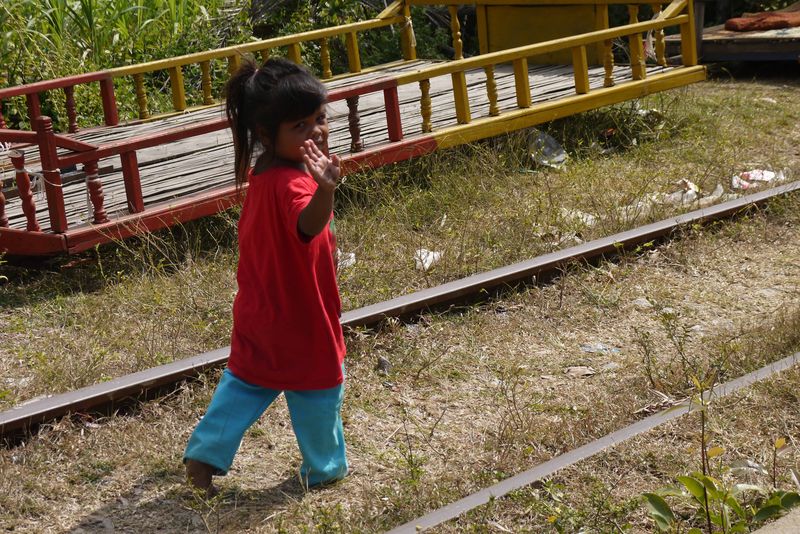
27 Jan Thoughts on Bad Tourism and How to Travel Responsibly
Causally throwing a banana chip into my mouth I leaned out of the stationary tuk-tuk and craned my neck up towards the cave above, waiting for the million-strong swarm of bats to flood out of its entrance into the gathering dusk. A boy of about eight or nine, bare-foot and messy-haired, wandered past our vehicle and I smiled as our eyes met. My banana chips captured his attention and for a moment I began to stretch my arm out to offer him some before remembering: we’re not supposed to give things to kids, especially not here in Cambodia where child-begging is such a problem.
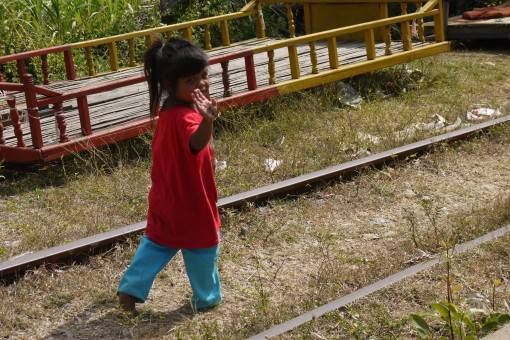
A child begging in Cambodia
Why we don’t give Money to Children who Beg
It pained me to pull the chips away and the boy paused, sensing my weakness, pointing his finger at the bag. I felt like a selfish, greedy western tourist denying him this small pleasure I didn’t even need, would it really hurt to give him just one banana chip? I thought back to the time in the Philippines when I gave a little girl a shiny green apple; seconds later another child appeared, her sister perhaps, begging for more. Immediately I saw the error of my ways; not only had my gift bred jealousy, it had also taught the girls that begging works. In turn, I had also encouraged the girls’ parents to send them out on the streets to work when they should be at home or in school.

Giving Blood in Cambodia
As I’ve since learned, organisations in Asia such as Child Safe Tourism ask visitors not to hand money or gifts straight to children who beg, however tempting it may be. Child Safe points out that giving directly to children just perpetuates the practice of begging and keeps kids out on the streets where they’re incredibly vulnerable to abuse. Instead, you can give money or help more responsibly through donating to organisations listed on the Child Safe Tourism website. While in Cambodia we chose to give blood to the Angkor Hospital for Children and eat at NGO restaurants to help kids instead of supporting begging.
Bad Tourism Traps and How to Avoid them
As Andrew and I have discovered since travelling in Asia, there are all kinds of ways that tourists, often despite their best intentions, can have a negative impact on a place and cause more harm than good – giving money or gifts to children who beg is just one of them. The issues surrounding what I refer to as ‘bad tourism’ are incredibly complex and we, as tourists, need to be constantly aware of how we behave as we travel.
We don’t claim to be perfect travellers and we’ve done things we regret in the past, such as giving that Filipino girl food, but we are constantly trying to learn how we can travel more responsibly. Aside from child begging, here are a few of the most visible bad tourist practices we’ve come across while travelling in Asia and how we avoid contributing to them.
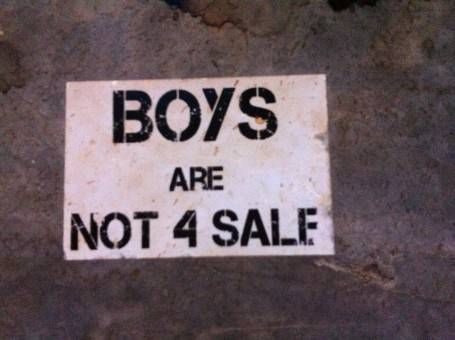
Anti Sex-Tourism Sticker in Thailand
Sex Tourism
This is the issue that angers me the most; sex trafficking and tourism is an extremely destructive global problem which enslaves and ruins the lives of millions of people. Nicholas Kristof and Sheryl Wudunn, authors of Half the Sky, write that worldwide around three million women and girls, as well as a small number of boys, are currently trapped in the sex trade. In my opinion tourists who contribute to the sex industry at home or abroad, be it through involvement in prostitution, strip clubs or sex shows, perpetuate the oppression and exploitation of vulnerable people. Even if you believe many people work in the sex industry out of ‘choice’, how do you tell whether the person you’re engaging with is a ‘willing participant’ or forced to work? I’d recommend reading Half the Sky (Nicholas Kristof and Sheryl Wudunn: 2009: Random House) and The Industrial Vagina, The Political Economy of the Global Sex Trade (Sheila Jeffreys: 2008: Routledge) to find out more about these issues.
Animal Tourism
Sadly, in Asia animals are often used as photo props and cute gimmicks to make money from tourists. In particular we’ve seen plenty of monkeys, horribly abused and as far away from their natural habitat as they can get, forced to work by their owners. In Jakarta for instance, a macaque chained to a post performed handstands for passersby while its child-owner begged us for money; in Koh Tao, Thailand we spotted a gibbon tied to the branches of a tree, rocking back and forth in distress while his owner napped in a boat nearby.
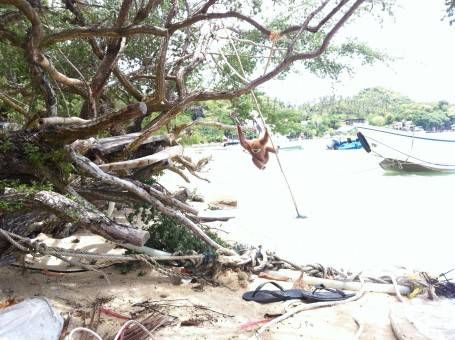
Enslaved gibbon in Koh Tao
On our visit to the Elephant Nature Park in Thailand we also learned about the issues surrounding elephant tourism in Asia. These gentle animals are horrifically tortured into submission so that they can make money for their owners through tourist rides. In Indonesia it was common to see horses chained up all day in the stifling heat waiting to carry tourists around in carts and there are plenty of badly run zoos, crocodile and snake farms across Asia where animals are neglected and abused. Added to all this, the amount of skinny and injured cats and dogs roaming the streets in Asia is enough to make you despair.
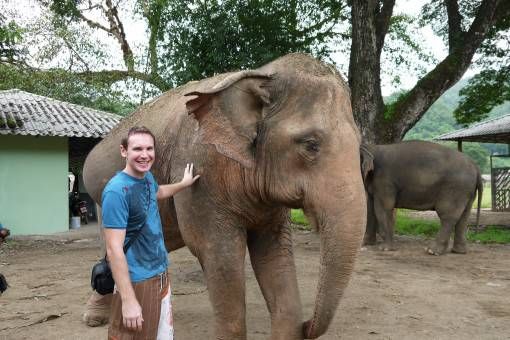
Andrew at the Elephant Nature Park
While the laws surrounding animal welfare in Asia aren’t likely to improve overnight, tourists can help protect creatures a great deal by simply not contributing to unethical animal tourism. There are plenty of ways you can responsibly get up close to wildlife in Asia; volunteer for a certified programme or visit respected sanctuaries such as the Elephant Nature Park, the Tarsier sanctuary in the Philippines or the Sepilok Orang Utan Sanctuary in Borneo. We choose not to feed, ride or be photographed with animals if we’re uncertain where our money is going or how the animals are treated.
Disrespecting Cultural Practices
The daily alms giving ceremony in Luang Prabang, Laos, is an example of just how badly tourist behaviour can affect cultural practices. Every morning hundreds of monks from nearly 80 temples surrounding Luang Prabang walk silently through the streets collecting sticky rice from locals. This centuries-old tradition is now on the verge of being scrapped due to the actions of disrespectful tourists who turn up dressed inappropriately and proceed to interrupt the procession by talking noisily, blinding monks with camera flashes and stepping out in front of them.
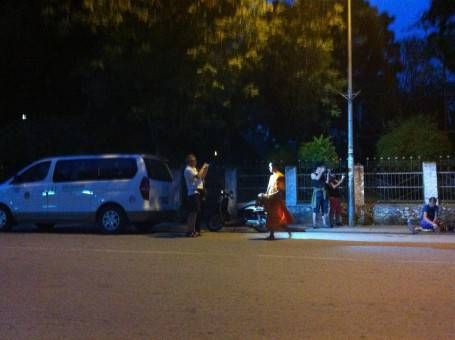
Tourist snapping a picture of a monk in Laos
All this occurs despite the fact that there are posters plastered all around the city instructing tourists on how to behave respectfully. We headed out early one morning to watch the ceremony; sitting quietly across the road from the procession as instructed, we were shocked to witness tourists getting in the monks’ faces and snapping photos. Amazed, we watched as one man chased the monks down the street, an alms bowl in one hand, his camera in the other. We felt awkward even watching from a distance and left, wondering whether the best thing we could have done to honour this sacred tradition would have been to avoid it altogether.
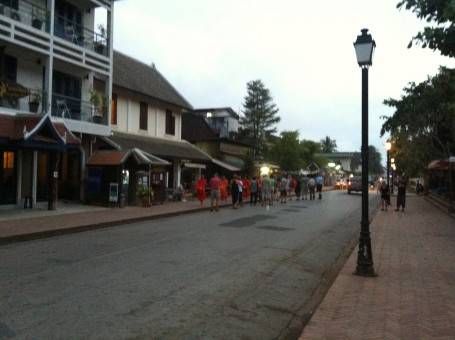
Tourists Photographing the Alms Ceremony, Laos
This is just one example (and a pretty extreme one) of how tourists can be culturally disrespectful. Not covering up at temples and religious sights, getting ridiculously drunk, showing affection in public or inadvertently making an inappropriate gesture or comment can offend local people and give tourists a bad name. We try to read up about local and religious customs before we visit a place and dress and act appropriately but it’s easy to make mistakes and carry the constant fear that we might be causing offense somehow.
Environmental Damage
There definitely isn’t as much general concern for the environment in Asia as there is in the west; littering and pollution levels are endemic problems and are caused primarily by locals. However, we’ve also witnessed ways in which tourism negatively affects the environment as we’ve travelled. We noticed a build up of tourist-related rubbish such as beer bottles, on the Thai islands of Koh Phi Phi and Koh Tao as well as noise pollution in backpacker districts, coral reef destruction and land clearance for tourist resorts throughout Asia.

Boats crowding Halong Bay
While our idyllic boat trips in New Zealand’s Bay of Islands and the Whitsundays in Australia were tightly controlled by government environmental guidelines and the waters weren’t overcrowded with boats, our trip to Halong Bay in Vietnam was a completely different story. Due to the amount of companies operating in the bay, we found the tourist services were appalling, focused only on getting as many people on quick overnight trips as possible. We were also sad to find that the bay’s natural beauty and peacefulness had been sullied by the huge influx of tourists – dozens of boats littered the bay blaring music at night while hordes of tourists were shuttled through the caves and beaches in conveyor-belt fashion.
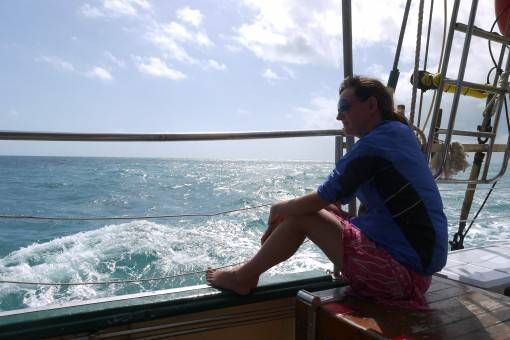
Sailing the Whitsundays
We try to seek out eco-friendly tour companies and activities wherever possible as we travel but that isn’t always easy in Asia as there aren’t any trading standards and companies can easily make unsubstantiated claims about the services they offer. We also keep up our western practices of simply always using bins and recycling wherever possible as well as conserving energy by turning off lights and air conditioning when we’re not using them.
As I mentioned above, there are so many issues involved in bad tourism and we certainly don’t claim to have all the answers to these problems – these are just a few thoughts on some of the issues we’ve faced so far.
What kind of bad tourism practices have you encountered on your travels and how do you deal with them?





Kellie
Posted at 16:43h, 27 JanuaryIt so difficult not to give to children who beg, I know its for the right reasons but it still breaks my heart a little bit.
Our beach here in Mexico is just off the 2nd longest reef in the world, its beautiful. Except that the beach is literally covered in plastic, bottles, shoes, combs, if its made of plastic you can generally find it on our beach. Really makes you think about the impact we have on our environment.
Really enjoyed this Amy 🙂
Amy
Posted at 02:00h, 28 JanuaryThanks Kellie. You’re right, it is heart-breaking having to ignore kids who beg, it’s been one of the most difficult parts of travelling in Asia for us. All that plastic sounds horrid; we see plastic everywhere in Asia too and it’s always shocking, especially since in the UK everything is so clean.
Beth
Posted at 18:55h, 27 JanuaryWhat a wonderful blog piece -super informative as we are planning our journey to SE Asia and have similar concerns. One other piece to mention is volunteer tourism, particularly orphanage volunteerism… We were appalled to discover orphanages being set up throughout Asia for the purpose of making money from tourists with children who were not even orphans living in terrible “pity worthy” conditions. Shocking!!
Amy
Posted at 02:04h, 28 JanuaryThanks Beth. You’re absolutely right about volunteerism, we’ve also heard about fake orphanages being set up in Asia – it’s disgusting. If we want to volunteer, we check and re-check that the organisation we’re going to be working for is legit and make sure we know where any fees are going. It’s a really difficult issue though.
Alyson
Posted at 01:12h, 28 JanuaryHi! Me again. Some of your thoughts I agree with, some I don’t. As a parent I know how much a sneaky bar of chocolate means to a child. They LOVE it, and that makes me happy. Axx
Amy
Posted at 02:08h, 28 JanuaryHi Alyson, we do find it really hard to ignore children so we try to help them in other ways as we travel. As I mentioned, all these issues are complex and everyone has a different take on them – I’m grateful that travel has opened my eyes to these issues and I’m able to discuss them with other travellers 🙂
Patti
Posted at 05:29h, 28 JanuaryInteresting and informative post. I think when traveling anywhere in the world travelers really need to do their homework, pay attention to their surroundings and learn from others. Before traveling to Europe (Paris) last year I did a lot of reading about scams and some of the things you talked about with children. There are a lot of children who run the scams and we saw several examples of it on the streets. You’re right, it’s hard to say no, so better to just walk onward with eyes forward and do as you’ve learned to do – help where it is truly needed.
Amy
Posted at 06:53h, 28 JanuaryInteresting that you encountered similar issues in Paris Patti; you’re right, we all need to be aware of these issues wherever we are in the world.
Casey @ A Cruising Couple
Posted at 19:57h, 28 JanuaryThis is a great and really comprehensive post. We are actually in the process of writing a similar one. The issue about children is really difficult, especially since they are often being controlled and manipulated. Once in India I couldn’t take it and I gave a few children a loaf of bread to share. Within moments I was surrounded by nearly twenty. I had to go into a building monitored by security so things didn’t get out of hand. The whole situation is extremely difficult and I don’t think there is really one right or wrong answer to it, only that it calls for a more comprehensive way to address poverty. As you mentioned, finding ways to support local NGOs that have their hands on in the community is a great way to start.
Amy
Posted at 10:53h, 29 JanuaryHi Casey, I agree that the answers to these issues aren’t clear-cut; I can totally see why you were drawn to give those kids bread, I felt the same way in the Philippines. Making the decision to never give directly to children and help in other ways from now on though has made things a bit simpler for us.
Jenna
Posted at 00:21h, 03 FebruarySo many important issues. I hope many of these will be resolved in the future, but it’s necessary for us to think about them and educate others now.
Amy
Posted at 05:24h, 03 FebruaryHi Jenna, thanks for commenting. I hope this article encourages people to think about these issues too, hopefully then things can change for the better over time.
Heidi Wagoner
Posted at 20:10h, 04 FebruaryGreat post! It does pull at your heart strings to see the children in such a bad state and it seems so easy to just give them so little. We just returned from Morocco and it is really difficult not to give to them. With our kids in tow, we tried to teach them how we are enabling the begging if we give. They of course were full of questions and wanted to give as well. In the end we didn’t but it is a good life lesson. It was also difficult to see the animals as well as the people trying to con tourists.
Thanks for sharing this and reminding us all that we often help create exactly what we don’t want. We all want to “see” or be part of a culture, but then we ruin it with disrespect. Alan and I are scuba divers and the same goes for underwater. A beautiful untouched reef may be discovered and in years to come the tourists arrive and don’t take care. The reef slowly or rapidly begins to die. It is a vicious cycle, only if we were all just a little more aware. By the way, I am not saying we are perfect either! We make our mistakes too.
Amy
Posted at 05:28h, 05 FebruaryI bet it was hard explaining that to your kids Heidi, but as you say, it was a great life lesson for them. Some interesting points about scuba diving too, thanks for adding those.
Alex
Posted at 17:31h, 11 FebruaryI totally reason with you, guys! I have seen sooo many wrong behaviours while travelling that sometimes I feel that is not a good thing to promote that much travelling. Especially in very special places, with a lot of traditions. I would love to see that people do not offer beggers(especially children and old people) money or products anymore and realise that they do more harm than well by trying to be kind.
Well done! I love your blog! Happy Travelling!:)
happytraveller.ro
Amy
Posted at 05:53h, 12 FebruaryHi Alex, thanks for commenting. I too think that there are better ways we can all help rather than giving money to people (especially children) who beg. We’re always looking out for positive ways to contribute while we travel whilst trying to make sure we don’t do more harm than good.